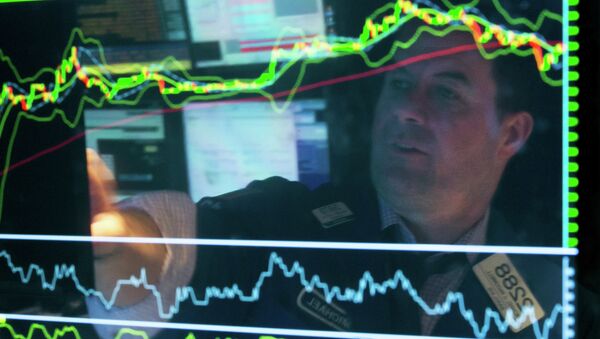Kristian Rouz — Despite a nearly 50% decline in active US oil derricks and a slightly slower crude production in North America due to lower energy prices, US oil inventories are approaching their highest-ever level, undermining the fragile balance in the global oil market.
Crude prices declined on Tuesday as traders are looking forward to this week's US oil reserves data, the consensus view is that US oil stockpiles at the nation's storages and refineries are at a peak, beating the all-time high, this week.
June-delivery futures for Brent crude dropped $0.43 to $64.40/bbl, while US WTI June futures shed $0.4 down to $56.59/bbl. This is still far above this year's lows, yet still a shock after Brent surpassed its 4.5-week highest at $65.80/bbl last week amidst strong expectations of a further rally.
Expectations of a rally were also fueled by the remarks of Saudi oil minister Ali al-Naimi, who said Tuesday he was expecting the demand for oil in Asia to increase due to the expansion of the energy-consuming idle class in several of the most advanced Asian nations. This is a controversial statement as economic growth in the region is cooling considerably, while household income is severely polarized, a common trend for the Third World.
Nonetheless, one of the UK's biggest banks, Barclays, has improved its 2015 oil price outlook by $9/bbl — to an average of $60/bbl for Brent crude this week (and by $8/bbl to $54/bbl in US crude), citing a bullish market as the main reason. However, the bank noted, soft macroeconomic data in the world's most prominent economies may impair energy valuation.
The structure of the oil market, however, has turned into a contango in Q1 2015, as evidenced by the data, with the biggest players holding cheaper oil in storage rather than putting crude for sale immediately. Traders in Houston, London and Singapore are all pursuing a similar tactic — accumulating large volumes of crude, expecting energy prices to grow to a certain level, only to start selling crude once the price reaches a higher level.
The UK's BP made some $1.4 bln by simply holding about 28 mln bbl in reserves. That amount of oil equals one month's extraction of British North Sea crude. France's Total recently also said it contributed to the ‘improved market conditions' (more expensive energy), most likely by withholding large volumes of oil from the market.
Contango tactics provide the European oil giants with a competitive edge against their bigshot US rivals like Chevron and Exxon Mobil. American oil giants are losing the domestic competition to smaller shale oil firms and are forced to sell assets and put oil to the market to make ends meet.
Last year also provided a stunning example of an outburst in the global oil price volatility with crude declining from some $110/bbl to $45/bbl, then rebounding somewhat to $65/bbl — all within a matter of 8-10 months. Some traders made serious money out of the increased market volatility, while others were totally wiped out. For instance, the international rating agency, Fitch, is expecting "healthy earnings in 2015 as they benefit from volatile oil prices."




